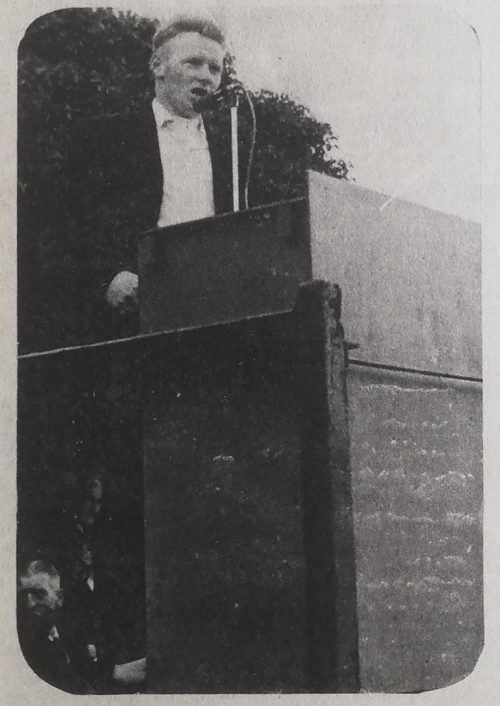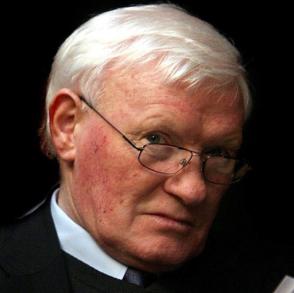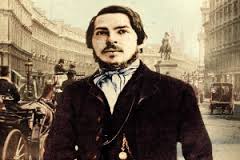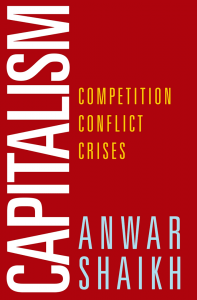On the second anniversary of his death, we republish Seán Garland’s oration at the annual Wolfe Tone commemoration at Bodenstown in 1968, as printed in the United Irishmen of July that year. In this speech, given at an important point in the development of the ‘New Departure’ of the Republican Movement in the 1960s, Garland outlines the Republican Movement’s definition of Republicanism, in line with that of Tone, Lalor, Pearse, and Connolly. In Garland’s words, Republicanism is a ‘developing tradition’ – from Tone to Connolly, and to the movement of which he was a leading figure, and one in which freedom meant an independent Socialist Republic in which ‘the mass of Irish people should exercise complete control over the means of Production, Distribution, and Exchange‘.
In this developing tradition he recognises the need for changes in structures, methods, tactics, to modernise the Republican Movement, to transform it into the vanguard organisation of the Irish people in their struggle for political and social freedom. He makes it clear that the basic tenet of the movement is that of ‘98, ‘16, and ‘56 – freedom for the Irish people. But he says that that the methods that have failed one generation must not be allowed to weigh down the next and thereby stymie the struggle for freedom for the Irish working class and the movement’s aim of establishing a Socialist Republic.
—
Bíodh an Cuimhneachán seo mar ardú meanman againn. Caithfaimid saol agus scríbhinni Wolfe Tone a scrúdú agus a cur faoi chaibidil i dtaobh an tsaoil atá inniu ann. An bhfuil teachtaireacht ina scríbhinni dúinn anois?
Bhi fealsúnacht simplí aige – ba mhaith leis go mbeadh deireadh le h-easaontas – go mbeadh cothrom na Féinne ag na gnáth daoine i dtír gaelach, gan roinnt. Tá sé de dhualgas orainn Náisiun Gaelach a chur i réim arís in Eireann. Coras in a mbeadh an teanga agus litríocht agus na gnéithe eile den Cultúr ag borradh agus ag fás.
Is iomaí comartha Náisiúntachais atá ann. Sí an teanga an comharta is tábhachtai agus is riachtanaí. I ngach Tír neamhspléach ar domhain tá bród ag na daoine as a teanga Náisiunta. Is í comhartha neamhspleachas i comhartha misneach, comhartha mór Náisiúin. Thar gach rud eile is comhartha i go bhfuil an Tír agus na daoine ann ag dul chun cinn agus go bhfuil sprid na ndaoine go láidir. Ceann de na cúiseanna is ciontach leis an drochsprid Náisiúnta atá i réim in Éireann inniu ná go bfhuil an teanga lag.
Thuig na Sasanaigh é seo na blianta a shoin nuair a bheartuigh siad ar an teanga a briseadh. Seo é an fáth go raibh na Sasanaigh ábalta smacht a chóiméad ar an dtír comh fada seo agus comh h-éifeachtúil. Thuigh Toin é seo agus ná déanfaimis-ne dearmad air inniu. Tá athbheochan na Gaeilge comh tábhachtach leis na h-aidhmeanna polaitaíochta agus sóisíalta atá romhainn agus caithfimid ár ndícheall á dheanamh in a thaobh. Má bhíonn bail ar gach cuid eile d’ar na-aidhmeanna agus má theipeann muid i gcúis na Gaeilge ní fiú dúinn leanúint leis an dtroid mar ní bheadh tada bainte amach againn.
Theobald Wolfe Tone was a Republican, a democrat, and above all a revolutionary. He did not seek to reform society but to create a revolution and all that the word implies. His thinking was logical and realistic. For the professional patriots, he had nothing but contempt. To these hypocrites and frauds in his day, as it is today, independence was only a slogan to be used by them whenever the occasion demanded, for their own selfish ends. It could, and indeed has been sold by them whenever the price was right.
Tone was not content with a simple separation from England. He wanted the essential human rights recognised in republican doctrines to triumph in his vision of a free Ireland. He wanted an end to Monarchy, to Aristocracy, and the exploitation for which they stood. He wanted an end to the senseless religious bitterness between Irishmen, that we all should recognise that irrespective of religions, we are brothers.
The first manifesto of modern Irish democracy, as Pearse called it, was issued by Tone, Neilson, and the United Irishmen in 1791. Its concern was with the Rights of Man in Ireland, which it defined as the “Greatest Happiness of the Greatest Number.” “On the rock of this principle let society rest, by this let it judge and determine every political question, and whatever is necessary for this end, let it not be accounted hazardous but rather our Duty, our interest and our common Religion. The Rights of Man are the Rights of God, and to vindicate the one is to serve the other.” This was the claim of the Irish Nation, to be free as enunciated by Tone and the United Irishmen. It is still the claim of the Irish Nation today, 170 years after Tone’s death.
We in the Republican Movement seek first to establish a united and politically sovereign state, ‘The Socialist Republic’ and we maintain that within such a State, the producers of wealth, namely the workers and small farmers, the mass of Irish people should exercise complete control over the means of Production, Distribution, and Exchange.
These are not just glib phrases borrowed from some textbook and trotted out for the sake of political advantage. This is our definition of Irish Republicanism in 1968. It is the same definition as that of Tone, Lalor, Pearse, Connolly, and all the other countless men and women who fought to free the Irish people.
We seek, as they did, to smash forever the suffocating stranglehold of both a native and foreign class over our political and economic affairs. Pearse in his last essay before the Easter Rising wrote “Separation from England would be valueless, unless it put the people, the actual people and not merely certain rich men in effective ownership and control of Ireland.”
Connolly said, “It is impossible for us to reconcile Irish Freedom with those insidious but disastrous forms of economic subjection, Landlord Tyranny, Capitalist Fraud.” For Republicans who follow Tone, there cannot be any doubts in their mind or hearts that Connolly was in the same developing tradition as Tone.
Connolly, like Tone, grasped the relationship between the struggle of the working people for a better life and the fight for Irish Freedom, for what Tone clarified and defined as Irish Nationalism – An Independent Irish Republic.
Lalor defined what Republicanism meant for the peasantry – the overthrow of Landlordism and the restoration of the land of Ireland to the people of Ireland; and Connolly defined what Republicanism meant to the industrial workers – The overthrow of the Capitalist Class and restoring to the workers control over the wealth they created.
For us to reject these definitions would be to reject not only Republicanism, but to reject the right of the Irish people to the ownership of their own country. For if Ireland without its people meant nothing to Connolly, how can Ireland without its people mean anything to us? How prophetic Connolly was when he said: “If you could remove the English army tomorrow and hoist the green flag over Dublin Castle, unless you set about the organisation of the Socialist Republic, your efforts would be in vain.” These words are as relevant today as when first uttered, for all about us we see striking evidence of how very right he was. Therefore our objective is and must be, a Socialist Republic…
Those who would reject change, because they wish to preserve the traditional image of the movement, must realise that it is not the Movement that is sacrosanct but the people, and, if the Movement, which must only be regarded as a weapon or instrument by which we can attain the freedom of the Irish people, is not good enough to carry out this function, then we must ruthlessly scrap it and forge a new weapon to do the job.
The traditional policy of the I.R.A. up to the present has been to prepare the army for an armed struggle and use the civil wings of the Movement simply as support groups for publicity, finance, recruits and suppliers of transport and friendly houses. There is nothing wrong with these ideas but the real and most important function of the civil wing has been overlooked and neglected – that is of being a bridge between the underground activities of the army and the people – the connecting link.
The function of the civil wing of all successful revolutionary movements has been to lead them in their agitationary activities. Therefore we should be leading the people by means of the civil wings in agitating for better working, living and social conditions, in agitating for land, showing them in all these fights that their enemies are their landlords, their bosses and their gombeen exploiters and finally get them to understand that all these opposing forces are banded together in an organisation called “the Establishment.”
This changes drastically our traditional line of tactics. There are no longer two different types of Republicans; physical force men and politicians. We in the Republican Movement must be politically aware of our objectives and must also be prepared to take the appropriate educational, economic, political, and finally military action to achieve them.
The Republican Army, north and south, must become the Army of the People, in fact, as well as in name. It must be the vanguard of all militant and radical revolutionary groups in this country and, as this vanguard, be ready to move in defence of those struggling for their rights.
The Republican Army, north and south, must become the Army of the People, in fact, as well as in name. It must be the vanguard of all militant and radical revolutionary groups in this country and, as this vanguard, be ready to move in defence of those struggling for their rights. It must be ready to defend a revolution in the making, to defend the people who are agitating for their rights in housing, to defend meetings of our own and our allies from being attacked by the thugs of the parties of vested interest. It must show the same line of action as was shown recently with E.I. and let the establishment and their proteges know that this was no isolated incident, that the day is past when the homeless, the worker, or the landless, struggling for their rights will be left unprotected. No longer will the Army of the Irish Revolution stand idly by while the vultures pick clean the flesh of the Cois Muintir.
The next phase of the struggle must be one in which the Movement commits itself and all its resources to the full so that when the struggle is over we will emerge either successful or annihilated. Let no mealy-mouthed sentimentalist tell us that we must preserve the movement as traditionally constituted if this proves impractical and hand on these impracticalities to the next generation. The struggle of the emancipation of the Irish people is inevitable and by saddling the next generation with useless tools and tactics we are not helping them but destroying their chances of success by binding them to a line of thought and action that was a failure with one generation and must just as surely be a failure with the next. We must be prepared for any structural or organisational changes as we are prepared for changes in tactics and simply regard the movement and its policies as a means to an end, remembering at the same time that the basics cannot change the basic is as it was in ’98, ’16, and ’56 – the freedom of the Irish people.
This is the message of the Wolfe Tone and here at Bodenstown we cannot conclude this commemoration held in his honour more fittingly than by quoting him. “Our independence,” he said, “must be had at all costs. If the men of property will not support us, then they must fall, we can support ourselves by the aid of that most numerous and respectable class of the nation, the men of no property…”
Seán Garland (7 March 1934 – 13 December 2018) was the General Secretary and President of the Workers’ Party at various times between 1977 and 1999. In the 1960s, Garland became a Marxist and was one of a generation of IRA leaders who attempted to lead the organisation away from violence and into left-wing political agitation. He worked closely in this with figures such as Cathal Goulding and Tomás MacGiolla. During the 1969/70 IRA split, Garland supported the moves to abandon abstentionism and was a key figure in Official Sinn Féin (as national organiser) and Official Irish Republican Army (as Adjutant-General).




